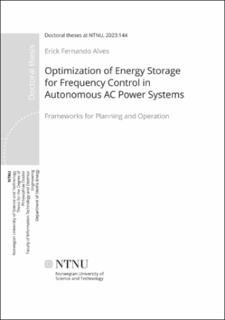| dc.contributor.advisor | Tedeschi, Elisabetta | |
| dc.contributor.advisor | Korpås, Magnus | |
| dc.contributor.author | Alves, Erick Fernando | |
| dc.date.accessioned | 2023-05-09T09:05:48Z | |
| dc.date.available | 2023-05-09T09:05:48Z | |
| dc.date.issued | 2023 | |
| dc.identifier.isbn | 978-82-326-5867-1 | |
| dc.identifier.issn | 2703-8084 | |
| dc.identifier.uri | https://hdl.handle.net/11250/3067209 | |
| dc.description.abstract | AC power systems have been designed to balance active power from the generation side, adopting technologies that offer three important properties: dispatch capability, ability to participate in frequency control, and large energy storage capacity. Such technologies have been displaced by variable renewable energy sources, such as wind and solar power, interfaced to the system via power electronic converters, which do not offer concurrently the three key properties of established equipment, thus introducing new dilemmas for planning and operation of power systems.
Alternative schemes are being deployed to increase control of power flows and optimize energy storage capacity. Flexible loads and distributed energy storage devices, for instance, can be coordinated by energy management systems to provide power balancing mechanisms. Such advances, on the one hand, allow adequate power dispatch, balancing reserves, and storage capacity to be reached. On the other hand, they have major technical and economic impacts, affecting capital and operational expenditures, security of supply, and power system stability. Therefore, it is necessary to review and improve the tools and methods employed for planning and operation of power systems to accommodate these changes. This issue becomes more critical in autonomous grids, where a limited number of generators and storage devices are regularly available.
This thesis is a collection of eight publications addressing this challenge. Together, they: 1) review the active power balance problem and the principles of frequency control and stability in ac power systems, 2) identify gaps in current modeling practices that can affect planning and operation of autonomous systems where high penetration of variable renewable energy sources exists, and 3) explore howfrequency control and stability constraints can be integrated into different power system optimization models. The main result is a set of frameworks that can be applied to optimization problems typically employed in planning and operation of autonomous systems. They are used for optimal sizing or scheduling of equipment and for ensuring stable and secure operation under dynamic uncertainty in different case studies of industrial oil and gas installations. Despite the focus in oil and gas applications, the main ideas and propositions can be generalized and applied to other autonomous systems, such as microgrids in islanded mode. | en_US |
| dc.language.iso | eng | en_US |
| dc.publisher | NTNU | en_US |
| dc.relation.ispartofseries | Doctoral theses at NTNU;2023:144 | |
| dc.relation.haspart | Conference poster 1: Alves, Erick Fernando; Sanchez Acevedo, Santiago; Tedeschi, Elisabetta. Power quality in wind-powered oil and gas platforms. EERA Deep Wind 2019 - 16th Deep Sea Offshore Wind R&D Conference; 2019-01-16 - 2019-01-18. Open Access This work is licensed under a Creative Commons Attribution 4.0 International License. Available at: http://dx.doi.org/10.13140/RG.2.2.11176.01289 | en_US |
| dc.relation.haspart | Journal paper 1: Alves, Erick Fernando; Sanchez Acevedo, Santiago; Brandao, Danilo Iglesias; Tedeschi, Elisabetta. Smart Load Management with Energy Storage for Power Quality Enhancement in Wind-Powered Oil and Gas Applications. Energies 2019 ;Volum 12.(15) s. – Open Access This work is licensed under a Creative Commons Attribution 4.0 International License. Available at: https://doi.org/10.3390/en12152985 | en_US |
| dc.relation.haspart | Conference paper 1: Riboldi, Luca; Alves, Erick Fernando; Pilarczyk, Marcin; Tedeschi, Elisabetta; Nord, Lars O.. Innovative Hybrid Energy System for stable Power and Heat Supply in offshore oil & gas Installation (HES-OFF): System Design and Grid Stability. Computer-aided chemical engineering 2020 ;Volum 48. s. 211-216. This accepted manuscript is licensed under a Creative Commons Attribution NonCommercial NoDerivatives 4.0 International License. Available at: https://doi.org/10.1016/B978-0-12-823377-1.50036-7 | en_US |
| dc.relation.haspart | Journal paper 2: Riboldi, Luca; Alves, Erick Fernando; Pilarczyk, Marcin; Tedeschi, Elisabetta; Nord, Lars O.. Optimal Design of a Hybrid Energy System for the Supply of Clean and Stable Energy to Offshore Installations. Frontiers in Energy Research 2020 ;Volum 8. s. - Open Access This work is licensed under a Creative Commons Attribution 4.0 International License. Available at: https://doi.org/10.3389/fenrg.2020.607284 | en_US |
| dc.relation.haspart | Journal paper 3: Alves, Erick Fernando; Bergna-Diaz, Gilbert; Brandao, Danilo; Tedeschi, Elisabetta. Sufficient Conditions for Robust Frequency Stability of AC Power Systems. IEEE Transactions on Power Systems 2020 s. - Open Access This work is licensed under a Creative Commons Attribution 4.0 International License. Available at: https://doi.org/10.1109/TPWRS.2020.3039832 | en_US |
| dc.relation.haspart | Journal paper 4: Alves, Erick Fernando; Mota, Daniel dos Santos; Tedeschi, Elisabetta. Sizing of Hybrid Energy Storage Systems for Inertial and Primary Frequency Control. Frontiers in Energy Research 2021 ;Volum 9.(649200). Open Access This work is licensed under a Creative Commons Attribution 4.0 International License. Available at: https://doi.org/10.3389/fenrg.2021.649200 | en_US |
| dc.relation.haspart | Journal paper 5: Alves, Erick Fernando; Polleux, Louis; Guerassimoff, Gilles; Korpås, Magnus; Tedeschi, Elisabetta. Allocation of spinning reserves for autonomous grids subject to frequency stability constraints and short-term solar power variations. Submitted to: Applied Energy. Pre-print DOI: https://doi.org/10.48550/arXiv.2203.07233 | en_US |
| dc.relation.haspart | Journal paper 6: Chapaloglou, Spyridon; Alves, Erick; Trovato, Vincenzo; Tedeschi, Elisabetta Optimal Energy Management in Autonomous Power Systems with Probabilistic Security Constraints and Adaptive Frequency Control. Submitted to: IEEE Transactions on Power Systems. Pre-print DOI: https://doi.org/10.48550/arXiv.2208.08953 | en_US |
| dc.title | Optimization of Energy Storage for Frequency Control in Autonomous AC Power Systems – Frameworks for Planning and Operation | en_US |
| dc.type | Doctoral thesis | en_US |
| dc.subject.nsi | VDP::Teknologi: 500::Elektrotekniske fag: 540 | en_US |
